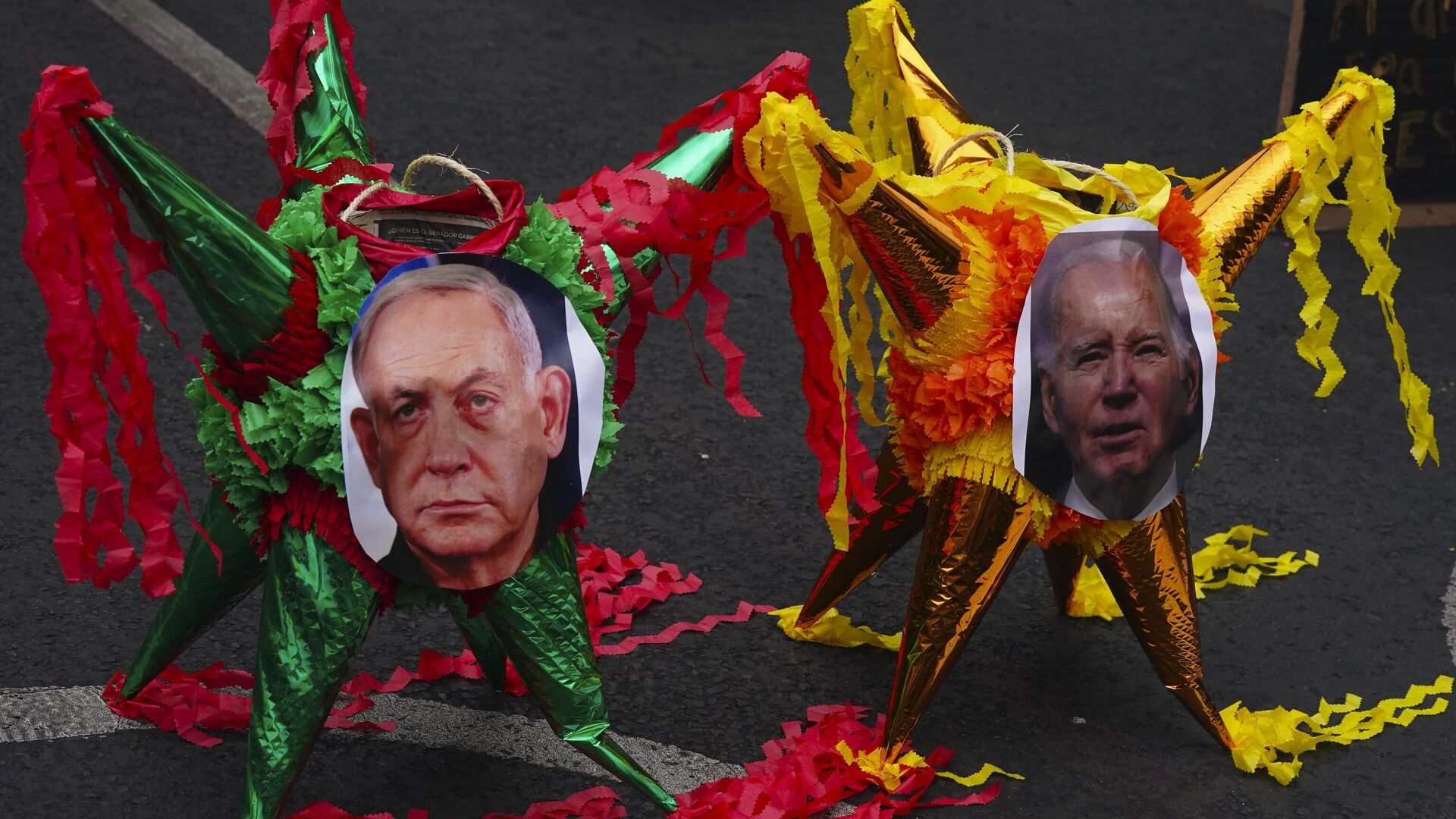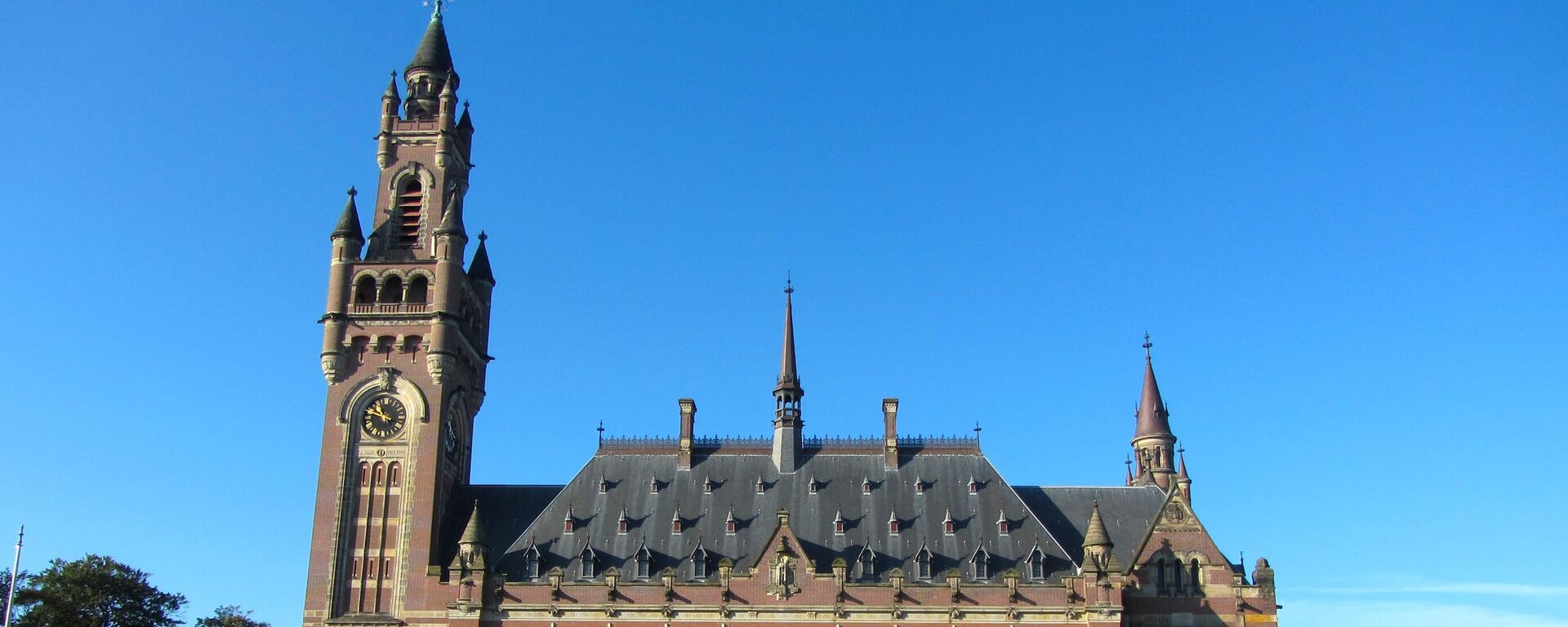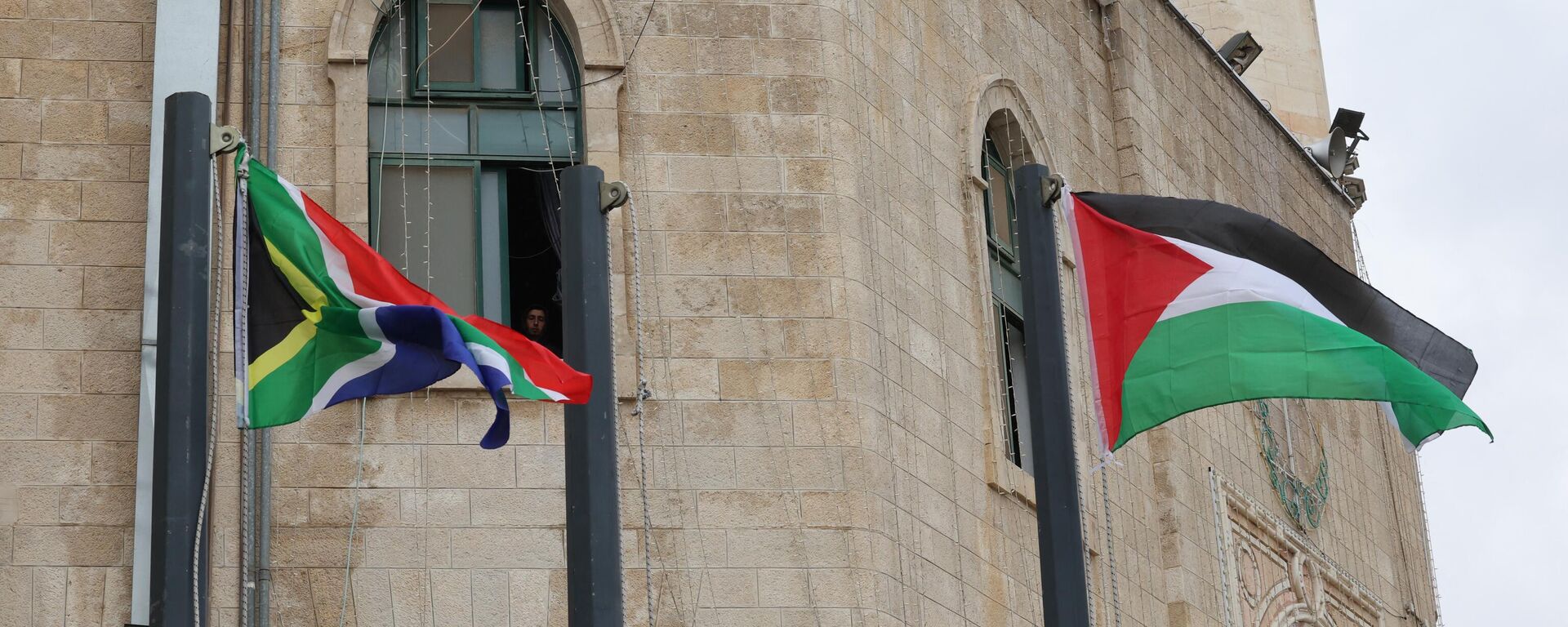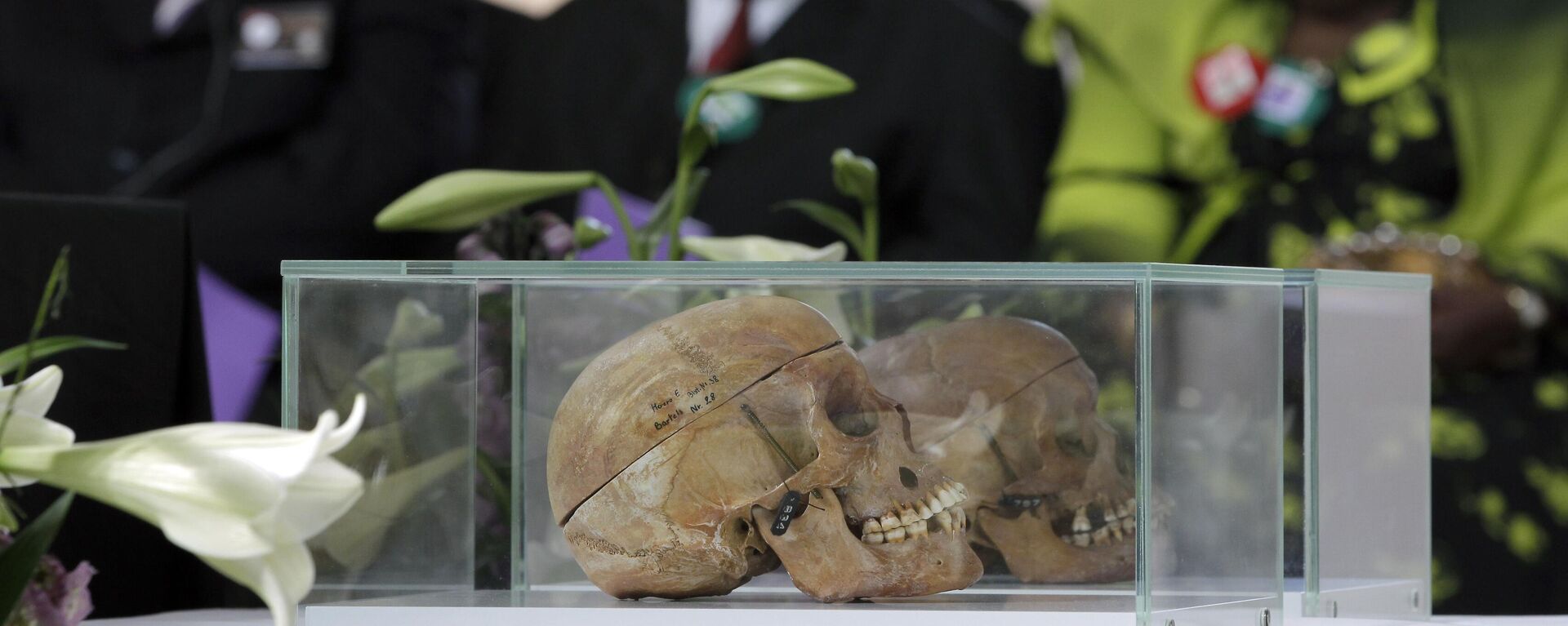https://en.sputniknews.africa/20240120/israel-cant-use-self-defense-as-blanket-to-kill-civilians-sa-leader-of-lawsuit-against-us-uk-1064712548.html
Israel Can't Use 'Self-Defense' as 'Blanket' to Kill Civilians: SA Leader of Lawsuit Against US, UK
Israel Can't Use 'Self-Defense' as 'Blanket' to Kill Civilians: SA Leader of Lawsuit Against US, UK
Sputnik Africa
In the wake of South Africa's petition to the International Court of Justice (ICJ) regarding Israel's actions in the Gaza Strip, a group of South African... 20.01.2024, Sputnik Africa
2024-01-20T18:04+0100
2024-01-20T18:04+0100
2024-01-21T08:42+0100
international
israel
united states (us)
united kingdom (uk)
south africa
israeli-palestinian conflict
palestine
court
international court of justice (icj)
gaza
https://cdn1.img.sputniknews.africa/img/07e8/01/14/1064713884_0:160:3068:1886_1920x0_80_0_0_8c0e2e784b53d0b5ec05b22a6af5eb20.jpg
About 40 to 50 lawyers from South Africa as well as the United States and the United Kingdom have expressed interest in supporting and participating in a civil class action lawsuit to be filed against the US and the UK for their role in Israel's ongoing actions in Gaza, Wikus van Rensburg, a prominent South African lawyer and the initiator of the legal action, told Sputnik Africa in an exclusive interview.Explaining the nature of the lawsuit, Rensburg emphasized that while the ICJ's ruling in the ongoing genocide case brought by the South African government against Israel will serve as a guide for the civil class action against Washington and London, the pursuit of justice for the people of Gaza, who have endured sustained bombardment and suffering, supersedes any legal precedent.The founder of the law firm Wikus van Rensburg Attorneys noted that the legal action was "initiated, first, by us submitting a notice of intention to institute proceedings."Speaking about the atrocities committed by Israel in Gaza as perceived in the context of the lawsuit, Rensburg pointed to the bombing of buildings, the loss of innocent lives due to collapsing structures, and the profound trauma experienced by children and women.He underscored the excessive civilian casualties, noting that the death toll, mostly civilians, has exceeded 24,000, with an alarming number of children among the victims. Rensburg expressed deep concern about the perceived justifications put forth by Israel, particularly the notion of "collateral damage" in the relentless conflict.On December 29, 2023, South Africa filed an application with the United Nations' International Court of Justice (ICJ), arguing that Israel's ongoing attacks on the Gaza Strip violate the UN Genocide Convention, signed in 1948 in the wake of the Holocaust. Last week, the court held two hearings on the case.Addressing the ongoing genocide case at the ICJ, Rensburg shed light on Israel's defense, emphasizing that the initial focus was on raising preliminary and jurisdictional issues, possibly as a tactic to challenge the admissibility of the case brought against the country.He expressed skepticism about the strength of Israel's defense, suggesting that the preliminary points raised might serve as a means of delaying the case rather than presenting a robust rebuttal to South Africa's allegations.In addressing the link between the responsibilities of the US and the UK and the actions of Israel, Rensburg broached the legal frameworks that would underpin the claims against these two Western countries.He referred to a specific US legislation that pertains to the actions of foreign government in the context of war, alluding to the need to navigate international laws governing war and war crimes in order to substantiate the claim against the US and the UK.Rensburg also mentioned the prospect of these legal actions being class actions, signifying an inclusive approach to addressing the adverse impacts on individuals affected by the alleged complicity of the US and the UK in supporting Israel.The South African lawyer noted that his team will file two separate lawsuits, one in a US federal court, likely in New York, where the team has approached a local law firm for assistance, and the other in the UK Supreme Court or High Court. Rensburg emphasized that the case holds the potential to underscore the accountability of nations that support entities that engage in unjust conduct, signaling a broader warning within the framework of international law. He highlighted the significance of establishing mechanisms for justice and relief for those affected by the conflict, and envisioned an outcome that would enable affected individuals to seek redress for the hardships they have endured.Discussing the criteria for a successful outcome, Rensburg emphasized the importance of a judgment in their favor, that would pave the way for financial compensation and enable affected communities to rebuild, access medical treatment, and overcome the psychological effects of the conflict. He expressed a commitment to securing substantial reparations, acknowledging the gravity of the repercussions experienced by the civilian population in Palestine.
https://en.sputniknews.africa/20240115/south-africas-position-in-icj-case-against-israel-is-very-strong-palestinian-minister-1064623938.html
https://en.sputniknews.africa/20240113/a-courageous-step-expert-on-importance--prospects-of-south-africas-icj-case-against-israel-1064602593.html
https://en.sputniknews.africa/20240116/rooted-in-lived-experience-why-namibia-objects-to-german-support-for-israel-in-icj-case-1064641365.html
israel
united states (us)
united kingdom (uk)
south africa
palestine
gaza
Sputnik Africa
feedback@sputniknews.com
+74956456601
MIA „Rossiya Segodnya“
2024
Muhammad Nooh Osman
https://cdn1.img.sputniknews.africa/img/07e7/04/0a/1058467512_0:0:1280:1280_100x100_80_0_0_ec723833bcbfcaed2e21952965ad99e4.jpg
Muhammad Nooh Osman
https://cdn1.img.sputniknews.africa/img/07e7/04/0a/1058467512_0:0:1280:1280_100x100_80_0_0_ec723833bcbfcaed2e21952965ad99e4.jpg
News
en_EN
Sputnik Africa
feedback@sputniknews.com
+74956456601
MIA „Rossiya Segodnya“
Sputnik Africa
feedback@sputniknews.com
+74956456601
MIA „Rossiya Segodnya“
Muhammad Nooh Osman
https://cdn1.img.sputniknews.africa/img/07e7/04/0a/1058467512_0:0:1280:1280_100x100_80_0_0_ec723833bcbfcaed2e21952965ad99e4.jpg
international, israel, united states (us), united kingdom (uk), south africa, israeli-palestinian conflict, palestine, court, international court of justice (icj), gaza, killing, human rights, africa in details
international, israel, united states (us), united kingdom (uk), south africa, israeli-palestinian conflict, palestine, court, international court of justice (icj), gaza, killing, human rights, africa in details
Israel Can't Use 'Self-Defense' as 'Blanket' to Kill Civilians: SA Leader of Lawsuit Against US, UK
18:04 20.01.2024 (Updated: 08:42 21.01.2024) Muhammad Nooh Osman
Writer/Editor
Longread
In the wake of South Africa's petition to the International Court of Justice (ICJ) regarding Israel's actions in the Gaza Strip, a group of South African lawyers led by Wikus van Rensburg is preparing to file lawsuits against the US and UK for complicity in Israel's alleged war crimes in the besieged Palestinian Gaza Strip.
About 40 to 50 lawyers from South Africa as well as the United States and the United Kingdom have expressed interest in supporting and participating in a civil class action lawsuit to be filed against the US and the UK for their role in
Israel's ongoing actions in Gaza,
Wikus van Rensburg, a prominent South African lawyer and the initiator of the legal action, told
Sputnik Africa in an exclusive interview.
Explaining the nature of the lawsuit, Rensburg emphasized that while the ICJ's ruling in the ongoing genocide case brought by the South African government against Israel will serve as a guide for the civil class action against Washington and London, the pursuit of justice for the people of Gaza, who have endured sustained bombardment and suffering, supersedes any legal precedent.
"The idea for this is that the ICJ judgment will be a good guideline for us to assess what would be the best course of action to approach our claim against these two countries. However, we are not bound by the ICJ and whatever it determines, because ultimately, to us, it's a matter of justice and the way the people are treated in Gaza with the continued bombardment, and the harm suffered by the civilian population within these different areas," the lawyer said.
The founder of the law firm Wikus van Rensburg Attorneys noted that the legal action was "initiated, first, by us submitting a notice of intention to institute proceedings."
"We will be fighting not only for a handful of individuals, but for the entire population of Gaza and, possibly, also the West Bank," Rensburg explained.
Speaking about the atrocities committed by Israel in Gaza as perceived in the context of the lawsuit, Rensburg pointed to the bombing of buildings, the loss of innocent lives due to collapsing structures, and the profound trauma experienced by children and women.
He underscored the excessive civilian casualties, noting that the death toll, mostly civilians, has exceeded 24,000, with an alarming number of children among the victims. Rensburg expressed deep concern about the perceived justifications put forth by Israel, particularly the notion of "collateral damage" in the relentless conflict.
"A third of the people dying being children. Honestly, children aren't collateral damage to any war, nor women. They didn't sign up for this and the excuse that Israel is using to say that look, they notify the people, it's just unfortunate," he said. "Sorry, but justice says there are limitations to self-defense [...] you cannot use it as a blanket to blanket-drop bombs."
On December 29, 2023, South Africa filed an application with the United Nations' International Court of Justice (ICJ), arguing that Israel's ongoing attacks on the Gaza Strip violate the UN Genocide Convention, signed in 1948 in the wake of the Holocaust. Last week, the court held two hearings on the case.
Addressing the ongoing genocide case at the ICJ, Rensburg shed light on Israel's defense, emphasizing that the initial focus was on raising preliminary and jurisdictional issues, possibly as a tactic to challenge the admissibility of the case brought against the country.
He expressed skepticism about the strength of Israel's defense, suggesting that the preliminary points raised might serve as a means of delaying the case rather than presenting a robust rebuttal to South Africa's allegations.
"They've raised the aspect of self-defense, Israel is entitled to defend itself. That is not in dispute. However, there are limits to self-defense. If someone attacks you by way of hand, and you pull out a gun and kill that person, you can't claim self-defense because it's exceeding the boundaries of self-defense," he told Sputnik Africa. "And their defense tendered at the ICJ will also give us an indication of what their defense would be in a civil suit."
In addressing the link between the responsibilities of the US and the UK and the actions of Israel, Rensburg broached the legal frameworks that would underpin the claims against these two Western countries.
He referred to a specific US legislation that pertains to the actions of foreign government in the context of war, alluding to the need to navigate international laws governing war and war crimes in order to substantiate the claim against the US and the UK.
Rensburg also mentioned the prospect of these legal actions being class actions, signifying an inclusive approach to addressing the adverse impacts on individuals affected by the alleged complicity of the US and the UK in supporting Israel.
The South African lawyer noted that his team will file two separate lawsuits, one in a US federal court, likely in New York, where the team has approached a local law firm for assistance, and the other in the UK Supreme Court or High Court.
"In a class action, we've experienced and observed that the court you approach is the federal court who exercises jurisdiction over a government that can provide you a judgment favorable and sufficient [and] lead to make right the wrong that has been committed," he argued.
Rensburg emphasized that the case holds the potential to underscore the accountability of nations that support entities that engage in unjust conduct, signaling a broader warning within the framework of international law.
He highlighted the significance of establishing mechanisms for justice and relief for those affected by the conflict, and envisioned an outcome that would enable affected individuals to seek redress for the hardships they have endured.
Discussing the criteria for a successful outcome, Rensburg emphasized the importance of a judgment in their favor, that would pave the way for financial compensation and enable affected communities to rebuild, access medical treatment, and overcome the psychological effects of the conflict. He expressed a commitment to securing substantial reparations, acknowledging the gravity of the repercussions experienced by the civilian population in Palestine.
"South Africa didn't experience any form of apartheid in comparison with what is being experienced in Gaza, that you can't even leave your country, you don't have freedom of movement," the South African lawyer said, explaining his motivation to help the people of Palestine. "All the rights that you take for granted, these people don't have."





